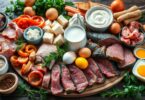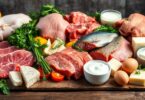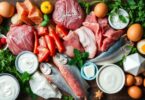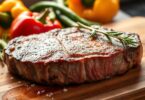Animal-Based Sources: Protein-Rich Food Options
Do you know about all the animal-based protein sources out there? From meats and seafood to dairy and eggs, the animal kingdom is full of nutrient-rich foods. But with so many options, how do we choose the best ones for us? Let’s dive into the world of animal-based protein and find some hidden treasures.
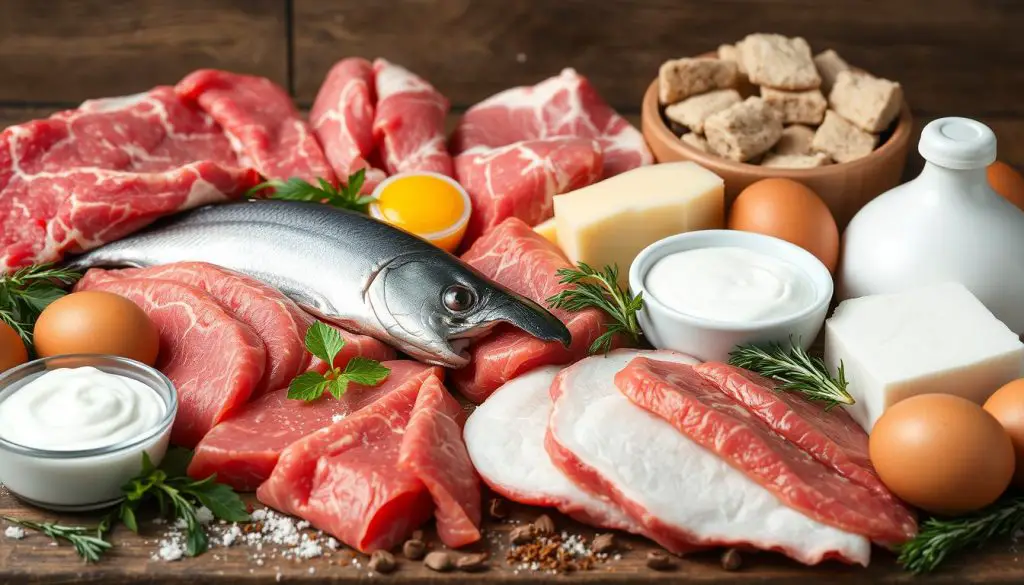
Key Takeaways
- Discover the wide variety of animal-based protein sources, including meat, poultry, seafood, dairy, and eggs.
- Understand the importance of protein in our diet and its role in muscle growth and repair.
- Explore the nutritional advantages and considerations of different animal-based protein options.
- Learn how to make ethical and informed choices when it comes to animal-derived ingredients.
- Gain insights on balancing your intake of various animal-based protein sources for a well-rounded diet.
The Importance of Protein in Our Diet
Protein is key for our health and well-being. It helps grow and repair muscles, keeps bones strong, and boosts our immune system. Getting enough protein is very important.
Protein’s Role in Muscle Growth and Repair
Protein helps grow and fix muscles. It’s made of amino acids, which are muscle building blocks. Eating enough protein helps repair and grow muscle, helping us stay strong.
Benefits of Adequate Protein Intake
- Supports muscle growth and repair
- Helps maintain a healthy metabolism
- Promotes strong bones and teeth
- Boosts the immune system
- Aids in weight management
Eating protein-rich foods is good for you. You can choose from meat, poultry, seafood, dairy, and eggs. Making sure you get enough protein in your diet is key for staying healthy.
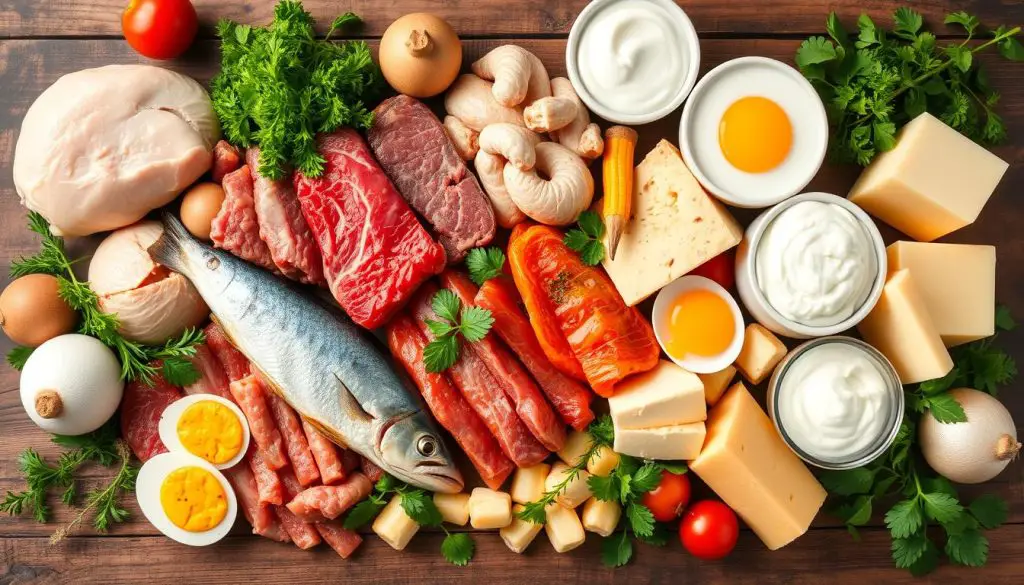
“Protein is the foundation of our muscles, organs, and immune system. Ensuring adequate protein intake should be a priority for anyone looking to maintain a healthy, active lifestyle.”
Meat: A Powerhouse of Protein
Meat is known for its high-quality protein, making it a key part of many diets. It comes in many forms, from classic cuts to special varieties. This variety offers many protein-rich options to try.
Varieties of Meat and Their Protein Content
There are many meat options for getting protein. Let’s look at some popular types of meat and how much protein they have:
- Beef – A 3-ounce serving of lean beef has about 26 grams of protein.
- Chicken – A 3-ounce portion of skinless chicken breast has around 27 grams of protein.
- Pork – A 3-ounce serving of pork tenderloin has about 22 grams of protein.
- Lamb – A 3-ounce serving of lamb chop has roughly 25 grams of protein.
- Turkey – A 3-ounce serving of turkey breast has around 26 grams of protein.
These meat options are not just high in protein. They also have important nutrients. This makes them great for a balanced diet.
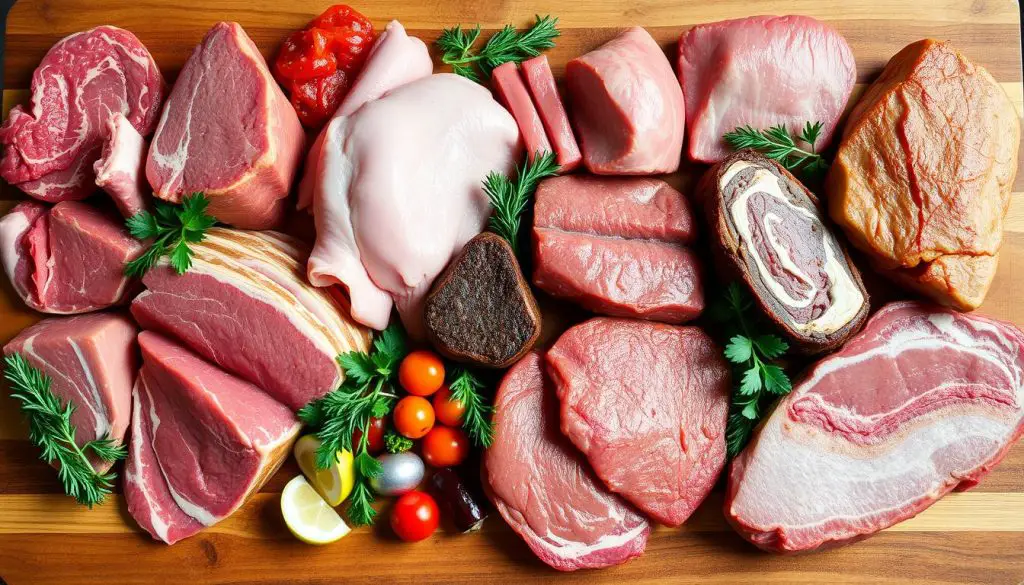
“Meat is an excellent source of high-quality protein, providing all the essential amino acids our bodies need.”
Eating a variety of meat can help you get enough protein. It supports your health and well-being.
Poultry: A Leaner Protein Source
Poultry is a lean and versatile protein source. Poultry is known for its lean protein content. This makes it a healthier choice compared to many other meats. Chicken, turkey, and other poultry options are great for a balanced diet.
Poultry protein helps grow and repair muscles. It has high-quality protein in poultry with a good amino acid profile. This supports lean muscle and is perfect for an active lifestyle.
Poultry also has other nutritional benefits. It has less saturated fat and calories than some red meats. This makes it a leaner choice for weight management. Plus, poultry can be cooked in many ways, offering tasty and varied meals.
“Incorporating poultry into your diet can be a simple and effective way to increase your protein intake while enjoying a delicious and nutritious meal.”
Poultry is great for building muscle, maintaining a healthy weight, or adding variety to your diet. Its versatility, nutritional value, and health benefits make it a key protein for any balanced diet.
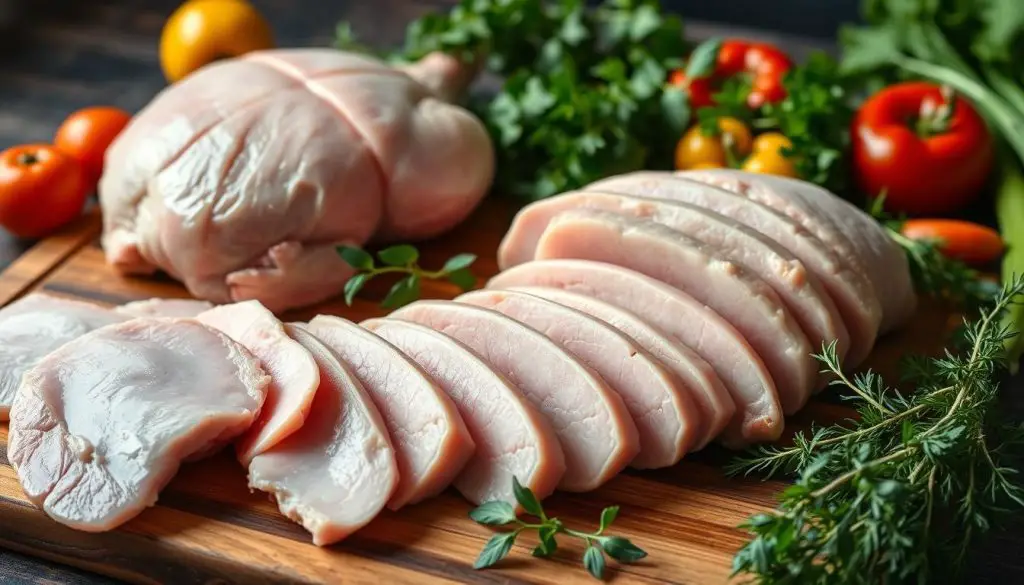
Seafood: A Diverse Range of Protein Options
Seafood is a great source of protein and is very nutritious. It includes fish and shellfish, offering many choices to meet your protein needs.
Nutritional Advantages of Fish and Shellfish
Fish and shellfish are not just high in protein. They also have many nutritional benefits. They are full of omega-3 fatty acids, which are good for your heart and brain. They also have important vitamins and minerals like vitamin B12, selenium, and iron.
Eating seafood regularly can greatly improve your health. It can help prevent heart disease, boost brain function, and support a strong immune system.
- Salmon, tuna, and mackerel are excellent sources of protein and omega-3s.
- Shrimp, lobster, and crab provide protein along with a variety of other essential nutrients.
- Oysters and clams are renowned for their high protein content and minerals like zinc and iron.
“The diversity of seafood options allows everyone to find a protein-rich choice that suits their taste preferences and dietary needs.”
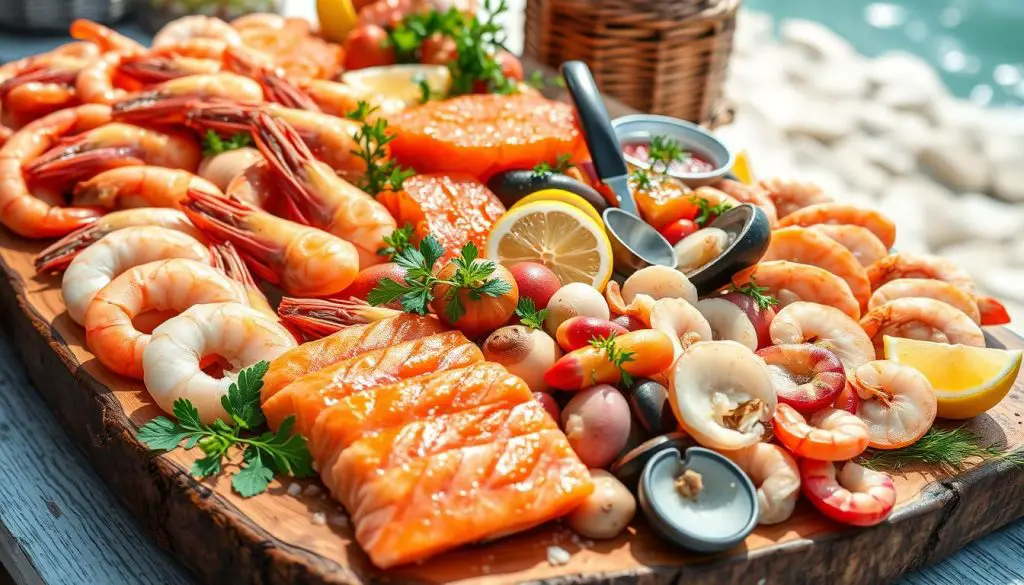
Whether you like the light taste of fish or the rich flavor of shellfish, there’s a lot to try. The world of seafood is full of protein-rich foods to enjoy.
Animal-Based Sources: Beyond Meat and Seafood
Meat and seafood are known for their protein, but there’s more. Let’s look at dairy products and eggs, two other great sources.
Dairy Products: Versatile Protein Providers
Dairy like milk, cheese, and yogurt are full of protein in dairy. Milk, for example, has high-quality animal-based protein that helps muscles grow and repair. Cheese and yogurt also have a lot of protein, making them good for a balanced diet.
Eggs: Nature’s Perfect Protein Package
Eggs are called “nature’s perfect protein.” They have all the amino acids our bodies need. Eggs are great, whether fried, scrambled, or poached, for adding animal-based protein to your meals.
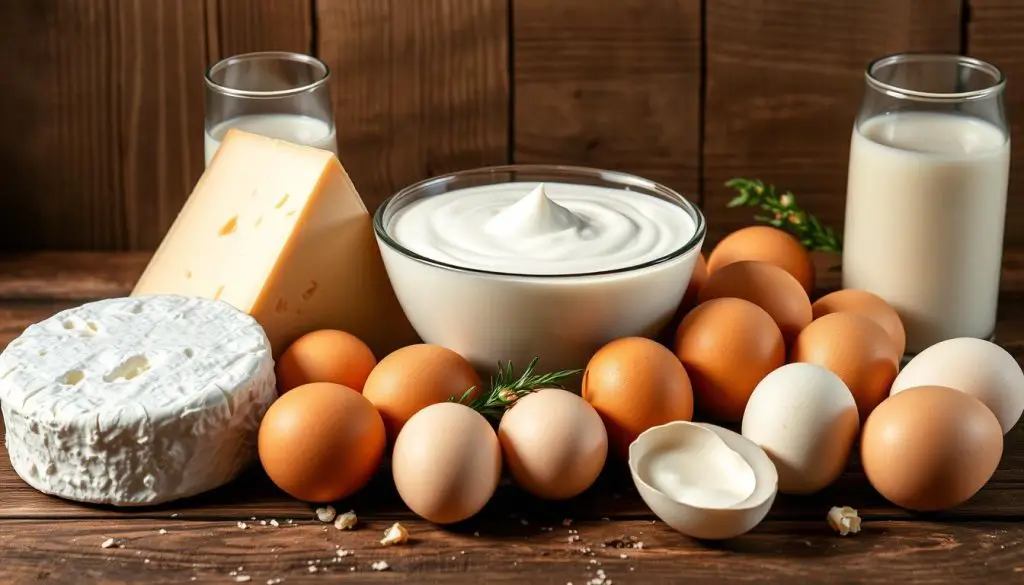
“Incorporating a variety of animal-based protein sources, like dairy and eggs, can help you meet your daily protein needs and support overall health.”
Beyond meat and seafood, dairy products and eggs offer many animal-based protein options. Adding these to your diet ensures you get the protein your body needs to do well.
Conclusion: Balancing Animal-Based Protein Sources
Finding the right mix of animal-based protein sources is key for good health and fitness. Meat, poultry, seafood, dairy, and eggs each bring something special to the table. This lets people incorporate animal-based protein in a way that fits their protein intake needs.
Mixing up the animal-based protein sources in your diet is smart. It makes sure you get all the amino acids, vitamins, and minerals your body needs. This helps with muscle growth, repair, and keeps your body running smoothly. It’s a smart way to boost your physical performance and health over time.
Knowing how important protein is and how to use animal-based protein sources wisely can help you reach your nutrition goals. It’s a way to live a healthy, active life. By choosing this balanced way, you can make the most of animal-based protein and keep your body strong and healthy.
FAQ
What are the best animal-based sources of protein?
The top animal-based protein sources are meat, poultry, seafood, dairy, and eggs. These foods offer high-quality proteins. They help with muscle growth, repair, and health.
How much protein do I need in my diet?
Protein needs vary by age, gender, and activity level. Adults should aim for 0.8-1.2 grams of protein per kilogram of body weight daily.
What are the benefits of incorporating animal-based protein into my diet?
Animal proteins have a complete amino acid profile. This makes them highly bioavailable and easily absorbed. They support muscle growth, repair, and maintain healthy bones, skin, and hair.
Are there any ethical considerations when it comes to consuming animal-based protein?
Yes, consider the source and production of animal proteins. Choose products from farms that care about animal welfare and sustainability. This ensures ethical choices.
Can vegetarians and vegans get enough protein from non-animal sources?
Absolutely! Plant-based proteins like legumes, nuts, seeds, and soy products are rich in amino acids. With the right planning, vegetarians and vegans can meet their protein needs without animal products.

